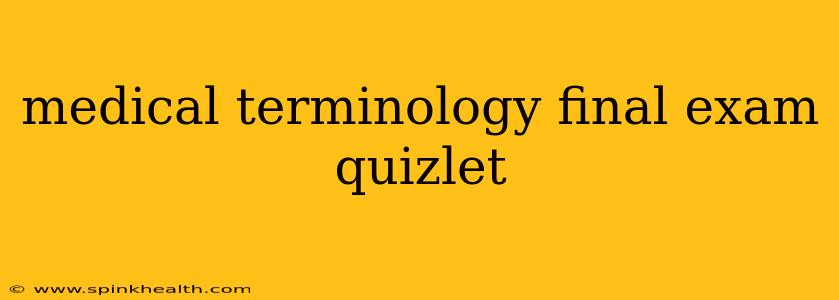Conquering Your Medical Terminology Final: A Student's Tale
The air hung thick with anticipation. Sweat beaded on my brow, not from the summer heat, but from the sheer terror of my upcoming medical terminology final exam. Quizlet had become my lifeline, a digital ocean of flashcards I'd been swimming in for weeks. But would it be enough? This wasn't just another pop quiz; this was the culmination of months of hard work, the gateway to my future in healthcare. My heart pounded a rhythm only slightly less complex than the human circulatory system itself.
I'd poured over countless flashcards, each one a tiny battle won in the war against medical jargon. But the sheer volume of information—prefixes, suffixes, roots, combining forms—felt overwhelming. It was like trying to assemble a thousand-piece jigsaw puzzle blindfolded. I needed a strategy, a way to conquer this beast and emerge victorious.
This is the story of my journey, and hopefully, a guide for you as you prepare for your own medical terminology final. Let's tackle this together, one term at a time.
What are the most important prefixes, suffixes, and roots in medical terminology?
This is THE question, the Everest of medical terminology. There's no single definitive answer, as the "most important" depend heavily on your specific curriculum. However, some consistently reappear:
-
Prefixes: Think directional prefixes like a- (without), anti- (against), brady- (slow), dys- (difficult, painful), hyper- (above, excessive), hypo- (below, deficient), inter- (between), peri- (around), poly- (many), supra- (above), tachy- (rapid). Understanding these directional indicators unlocks a huge chunk of meaning.
-
Suffixes: These indicate procedures, conditions, or specialties. Mastering suffixes like -algia (pain), -ectomy (surgical removal), -itis (inflammation), -oma (tumor), -pathy (disease), -plasty (surgical repair), -rrhea (flow, discharge), and -tomy (incision) is crucial.
-
Roots: The core of the word! Understanding roots like cardi- (heart), derm- (skin), gastr- (stomach), hepat- (liver), neur- (nerve), pulmon- (lung), and ren- (kidney) allows you to decipher numerous terms.
How can I effectively use Quizlet to study for my medical terminology final?
Quizlet is a powerful tool, but only if used strategically. Don't just passively flip through cards. Here's my approach:
-
Create Multiple Decks: Organize your flashcards by prefix, suffix, root, or body system. This allows focused learning.
-
Utilize All Features: Don't just use the flashcard mode. Experiment with Learn, Test, Scatter, and Spaced Repetition. These variations keep learning engaging and effective.
-
Active Recall: Force yourself to remember the definition before flipping the card. This reinforces memory.
-
Regular Review: Consistent, spaced repetition is key. Review your decks regularly, even after you feel confident.
What are some common medical abbreviations and their meanings?
Medical abbreviations are everywhere. Knowing common ones saves time and prevents misinterpretations. Familiarize yourself with abbreviations like:
- a.c.: before meals
- b.i.d.: twice a day
- p.c.: after meals
- p.o.: by mouth
- q.d.: every day
- t.i.d.: three times a day
- prn: as needed
This is by no means exhaustive, so consult your textbook or instructor for a complete list.
Are there any tips or tricks to help me remember medical terminology?
Absolutely! Beyond Quizlet:
-
Mnemonics: Create memory aids or acronyms to remember complex terms.
-
Visual Aids: Draw diagrams or use images to associate terms with their meaning.
-
Practice, Practice, Practice: The more you use the terms, the better you'll remember them. Try incorporating them into your everyday conversations (carefully!).
My final exam day arrived, and while nervousness still lingered, it was replaced by a newfound confidence. I had armed myself with knowledge, a strategic study plan, and the unwavering support of Quizlet. The exam wasn't easy, but I tackled it with a calm determination. The victory felt incredibly sweet—a testament to consistent effort and a strategic approach.
You can do this too. Remember, the journey through medical terminology is challenging but incredibly rewarding. Embrace the challenge, and soon, you'll be speaking the language of medicine fluently.

